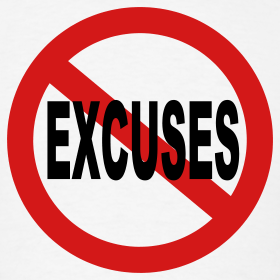
This is a stressful time for everyone. But a surprising number of friends and clients are using this unwelcome “leisure” time to accomplish things that they have been putting off for a long time. And much of this “putting off” usually involved the making of excuses.
It’s a rare mental health professional who even talks about the issue of making excuses, much less taking the position that excuses are bad. Other than myself, one of the few who has addressed the issue in writing is psychiatrist Dr. Anthony Daniels, known to many by his pen name, Theodore Dalrymple.
Dr. Daniels writes, “Excuses are barriers to self-understanding. Excuses like, ‘It’s not our fault if we’re obese,’ for example. Or, ‘It’s a disease. It’s the food manufacturers’ and restaurants’ fault. Portions are too big… or it’s genes, evolution, neurochemistry, brain scans, chemical imbalances, our childhoods…. I have a friend who goes up to people at parties and says, ‘I hate my parents; don’t you?’ People always go on about how their parents caused all their problems.”
Wise words, and they are true. Excuses are the primary barriers to self-understanding. When a person blames his or her parents for … whatever, that attitude reveals a failure to understand the real causes of the problem. Your problems are in the present, not the past, and they are primarily due to errors in thinking and/or behavior. They might be subconscious, but that doesn’t make you any less responsible for those errors — and capable of changing them. If your parents treated you poorly, the effect of that lurks in your ideas, attitudes and outlook on life. Different individuals respond differently to poor parenting. Some conclude that, “This isn’t how people should act, and it’s not how people have to act. I will do differently.” This can be easier said than done, and it can take time to identify all the errors in thinking that lead one to dissatisfaction with relationships. But it is indeed possible.
In its truest form, “therapy” means interrupting cognitive, behavioral or interpersonal cycles that are erroneous or otherwise counterproductive to happiness. The concept of “interrupting” implies two things. First, that you’re capable of looking at yourself objectively and rationally. A good therapist can be a sounding board to help with that process. Second, that you’re capable of changing or interrupting those cycles once you identify them.
Excuse-making short-circuits this otherwise healthy process. It’s an easy-way-out write-off of yourself. By externalizing blame, you remove responsibility from yourself and poison any opportunity to make your life better. Dr. Daniels points out that we’ve loosened the definition of “depression” to include most forms of unhappiness. The result is that 13 percent of adults (2013 Mayo Clinic research) are on antidepressants. Yes, some people who are on antidepressants do benefit from them. I have even recommended that some people be on them. But that’s only if the person fits a profile of what psychiatry defines as clinical depression, and if nothing else has really worked. It might take a few weeks or longer to determine if they do actually help.
Excuse-making has extended the definition of clinical “depression” to include just about every form of unhappiness, to every degree imaginable. In the process, the term has been rendered almost meaningless, not unlike other now-debunked psychiatric labels such as ADD, ADHD and the like – “diagnosed” in just about every boy in public school.
Using the crutch “depressed” instead of “unhappy” means someone has to cure it for us, says Dr. Daniels. He calls antidepressants the modern-day equivalent of exorcising alien spirits. But the reality is that the only treatment to which you can passively submit, in the psychiatric realm, is medication. You take it, you see what happens. It’s passive. But even if you take medication, and even if medication reduces your symptoms, you still have to actively identify the cycles of thought and behavior that created the problem in the first place. Therapy, or some similar commitment to ongoing self-change, is the only sure-fire way to move beyond mere functioning and into the realm of actual happiness. Beware the excuses and labels! They’re bad for you.
Follow Dr. Hurd on Facebook. Search under “Michael Hurd” (Rehoboth Beach DE). Get up-to-the-minute postings, recommended articles and links, and engage in back-and-forth discussion with Dr. Hurd on topics of interest. Also follow Dr. Hurd on Twitter at @MichaelJHurd1, and see drmichaelhurd on Instagram.
